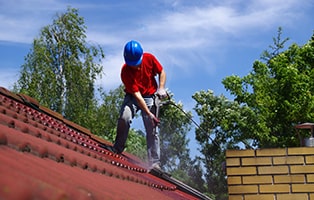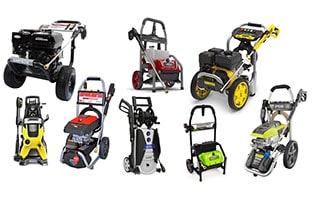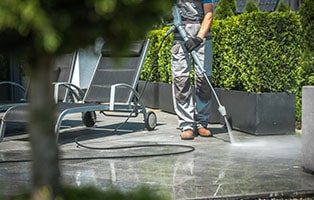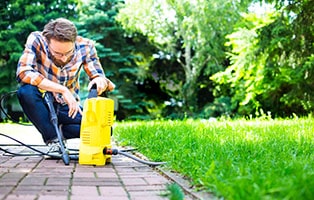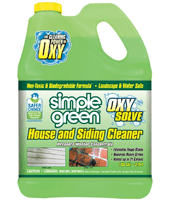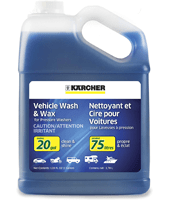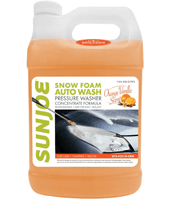 Find the Best Pressure Washer Soaps, detergents, and chemicals in Canada with our detailed reviews and buying guide
Find the Best Pressure Washer Soaps, detergents, and chemicals in Canada with our detailed reviews and buying guide
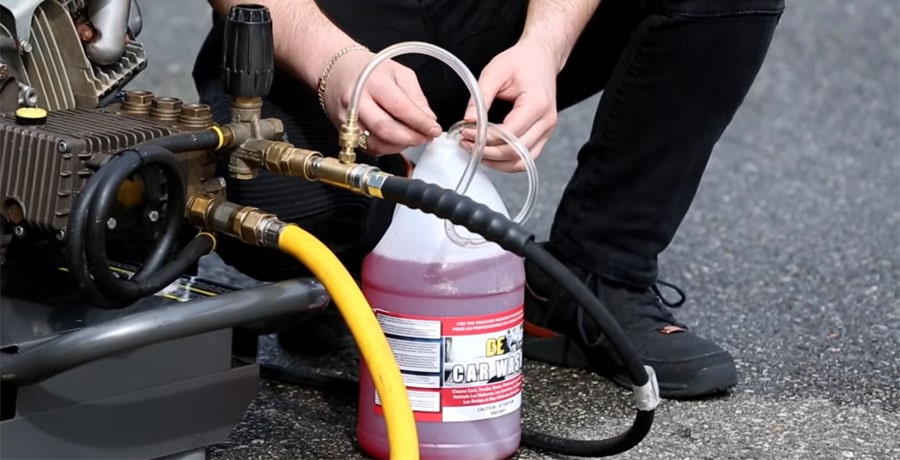
Soaps and detergents for pressure washers are not created equal. And you can’t just use any cleaner you come across. But the combo of soap and water spray is a double whammy for grime. Just ask your dishwasher. Whereas your dishwasher has the advantage of hot water, most pressure washers don’t. They make up for that with high pressure spray. Add soap to the mix, and you can speed up cleaning tenfold.
But what’s the difference between power washer soap and detergent?
Surprisingly enough, soap and detergent are not interchangeable. Real soap is derived from natural ingredients (like fats & oils) while detergents are made from synthetic substances (like carbonic compounds). Most of the “soaps” you use today are actually detergents.
When should you use pressure washer soap?
Since pressure washer soap is made of biodegradable ingredients, it will cause no harm if washed down storm drains. Some communities may have strict laws regarding that, which is why you’d want to stick with natural soaps when cleaning outdoors. Keep in mind that soaps mixed with hard water or collected rainwater may form calcium carbonate deposits that will get left behind on the surface you’re cleaning.
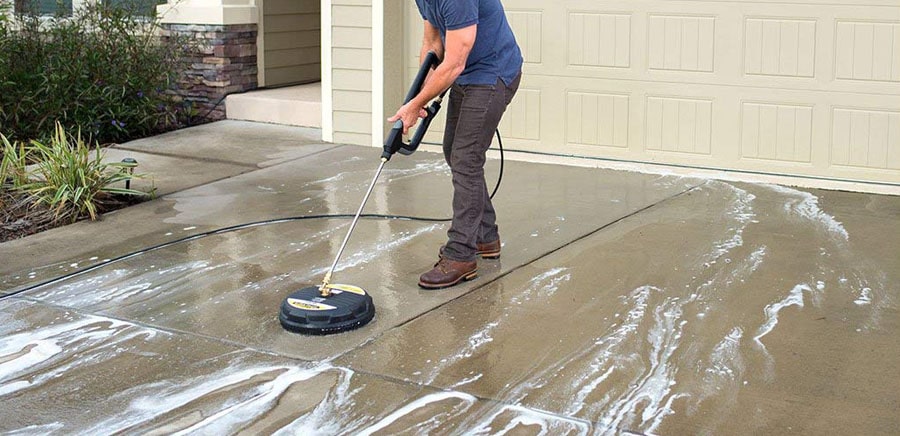
When should you use pressure washer detergent?
If there aren’t strict laws about water runoff, and you have years of built-up grime or stuck on dirt, you’ll want to go for a detergent. Detergents are stronger than natural soaps. They’re great for getting into porous surfaces you want to pressure wash, such as wood and concrete.
Can you use dishwashing liquid instead?
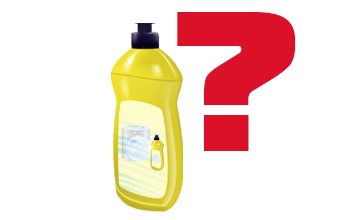
Avoid using dish detergents like Dawn and other household cleaning liquids because they’re not formulated to handle the high pressure spray and inner workings of a pressure washer. Those are designed specifically for removing grease and proteins left from food.
If at all possible, use only soaps and detergents designed for pressure washers and also for the type of cleaning (e.g. mildew or tree sap removal) and type of surface you need to clean (e.g. concrete or siding).
MoreTop-Rated Canadian Power Washer Soaps & Detergents: 2023 Ratings & Reviews
Why you can’t use regular soaps in pressure washers ?
Pressure washers are a bit finicky in that they require special soaps and detergents. Regular soaps such as laundry, dish, or household cleaners are not formulated to withstand the high pressure a power washer delivers.
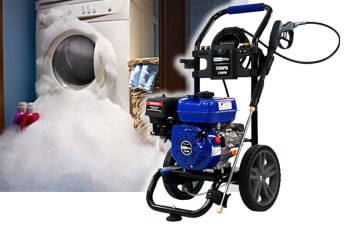
Think about a jacuzzi tub. If you’ve ever accidentally poured bubble bath in while the jets are on, you probably witnessed a fast-moving avalanche of suds that flowed over the sides of the tub. A similar thing can happen if you use a regular laundry detergent in a high efficiency front-loader. It’s the same concept. Specific cleaners are designed for the specific pressures and velocities of specific appliances.
So, when looking for a pressure washer soap or detergent, make sure it’s one designed specifically for pressure washers. Many of them can be used with any pressure washer, but be sure to check your pressure washer owner’s manual to see if the manufacturer recommends any specific cleaners and to see the recommended amounts.
The better you follow the recommendations, the longer your pressure washer will last.
What chemicals are used in pressure washer soaps & detergents?
There are 3 basic terms you’ll see thrown about on labels and product descriptions. Here is a very basic rundown of what they’re for.
- Cleaners – Dirt removal
- Sanitizers – Quickly (less than 30 seconds) kill up to 99.9% of bacteria
- Disinfectants – Kill ALL microorganisms within 10 minutes
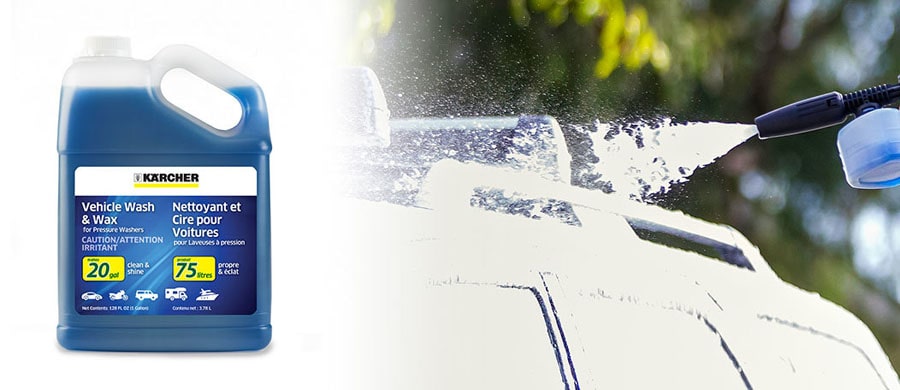
This is a list of chemicals you’ll see on many pressure washer cleaners & their general intended purposes:
- Citric acid – Removes stains from concrete and wood
- Oxalic acid – Removes rust & other stains
- Vinegar – Very gentle cleaning for kitchen surfaces, windows, even fresh produce. Polishes brass, neutralizes odors, safe for pretty much any surface
- Sodium hydroxide – May be called “caustic”. Quickly dissolves fats, oils, and grease on glass, steel and other surfaces.
- Sodium hypochlorite – Strong disinfectant & stain removal
- Bleach – Mix of sodium hypochlorite & sodium hydroxide. Very effective sanitizer & disinfectant. Ideal for mildew and mold removal
- Ammonia – Great for glass and stainless steel
- Potassium hydroxide – Essential in making soft or liquid soaps
Concerned about exposing your garden plants, waterways, pets, & kids to cleaners?
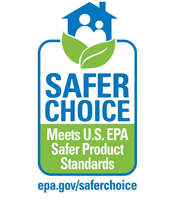
Well, you’re in luck. Many pressure washer cleaners are now biodegradable and won’t hurt your lawn or landscape plants. Several are actually endorsed by the EPA as a “safer choice” so they won’t harm wildlife or waterways. Some are even orally non-toxic so they won’t hurt your child or pet if they were to ingest them.
Look at the labels. The safety status should be easily visible. If in doubt, you can always contact the manufacturer or get hold of the MSDS sheets for detailed ingredients and their risks.
What about homemade pressure washer soaps and detergents ?
We get it. You’re concerned about costs and green living. But…we can’t recommend making your own pressure washer soap or detergent for a few reasons. One being that there are so many great choices already on the market that are environmentally friendly.
Also, by the time you gather up separate ingredients to mix up your own cleaner, you won’t be saving much money and certainly won’t be saving time. A jug of concentrated cleaner isn’t that expensive and goes a long way. Some of them make up to 30 gallons or more of cleaning solution.

Lastly, as we stated above, pressure washers require specific cleaners and dilutions that you may not be able to replicate at home. If any measurement is off, you risk damaging the pump and inner workings. Most likely, your warranty won’t cover any damage incurred from using an unapproved cleaner.
That’s not to say you can’t use a little homemade remedy to help the cleaning process. Think pre-cleaning. Use an undiluted white vinegar to spray on mildew and mold stains before you clean with the pressure washer. Let it soak or scrub it in, then clean with the pressure washer. You may not even need soap, and it’s totally safe for the environment.
Pre-treating with a bleach solution is also an option, though you have to be careful around plants and shouldn’t let it soak into the soil. It’s best to cover the area below with a tarp if you’ll be using bleach. But for stain and odor removal, killing mold and mildew, and disinfecting, bleach is the king.
Whatever you decide to use, don’t be afraid to try different soaps and detergents, different dilutions, and different application methods. It may take some trial and error before you find what works best for your cleaning needs.
Your Location (rating adaptation): Worldwide | United States | Canada

Pressure Washer Tips & Tricks
